#CLIMATE CHANGE
Text
If you're feeling anxious or depressed about the climate and want to do something to help right now, from your bed, for free...
Start helping with citizen science projects
What's a citizen science project? Basically, it's crowdsourced science. In this case, crowdsourced climate science, that you can help with!
You don't need qualifications or any training besides the slideshow at the start of a project. There are a lot of things that humans can do way better than machines can, even with only minimal training, that are vital to science - especially digitizing records and building searchable databases
Like labeling trees in aerial photos so that scientists have better datasets to use for restoration.
Or counting cells in fossilized plants to track the impacts of climate change.
Or digitizing old atmospheric data to help scientists track the warming effects of El Niño.
Or counting penguins to help scientists better protect them.
Those are all on one of the most prominent citizen science platforms, called Zooniverse, but there are a ton of others, too.
Oh, and btw, you don't have to worry about messing up, because several people see each image. Studies show that if you pool the opinions of however many regular people (different by field), it matches the accuracy rate of a trained scientist in the field.
--
I spent a lot of time doing this when I was really badly injured and housebound, and it was so good for me to be able to HELP and DO SOMETHING, even when I was in too much pain to leave my bed. So if you are chronically ill/disabled/for whatever reason can't participate or volunteer for things in person, I highly highly recommend.
Next time you wish you could do something - anything - to help
Remember that actually, you can. And help with some science.
#even when I was in too much pain to leave my bed#honestly I've been meaning to make a big fancy thorough post about this for literally over a year now#finally just accepted that's not going to happen#so have this!#there's also a ton of projects in other fields as well btw#including humanities#and participating can be a great way to get experience/build your resume esp if you want to go into the sciences#actual data handling! yay#science#citizen science#climate change#climate crisis#climate action#environment#climate solutions#meterology#global warming#biology#ecology#plants#hope#volunteer#volunteering#disability#actually disabled#data science#archives#digital archives#digitization
456 notes
·
View notes
Photo

The Arctic shipping route that not many people are talking about. By 2050 (if not sooner), a seasonal Transpolar Passage more than likely will open up across the Arctic Ocean via the North Pole. Few countries are seriously preparing for this new reality, except China.
107 notes
·
View notes
Text

sometimes i see a climate-related chart and there's no words to describe the gut punch that it delivers
34 notes
·
View notes
Text
the state of the world is actually making me feel a little crazy right now. I'm holding onto hope for people in general, but honestly lately I haven't been feeling much of it for myself.
watching the people I interact with daily ignore the multitude of problems and feeling stuck in an endless cycle of only going to work and coming home because almost everyone has abandoned covid protocols is making me feel like I have no real future.
My options feel deeply limited, choosing between further disability or deeper isolation. Plus the existential dread of a changing climate and seeing how it's impacting my community and communities around the world.
These are tangible concerns that I wish I could take concrete steps on (can't right now, cognitive decline and energy deficit), but everyone treats me like I'm some poor, misguided child who doesn't see how silly I'm being. They think I'm making up my problems, when I'm read stories about people suffering due to climate and catching covid repeatedly to this day.
I don't know, I'm just. worried they're right sometimes. But I also feel that they're wrong. Feels like a good life is constantly getting farther and farther away.
don't get me wrong, I have people I love and things that I love. I have small joys but. overall I feel like I'm slipping
20 notes
·
View notes
Text

F.3.1 Why is this disregard for equality important?
Simply because a disregard for equality soon ends with liberty for the majority being negated in many important ways. Most “anarcho”-capitalists and right-Libertarians deny (or at best ignore) market power. Rothbard, for example, claims that economic power does not exist under capitalism; what people call “economic power” is “simply the right under freedom to refuse to make an exchange” and so the concept is meaningless. [The Ethics of Liberty, p. 222]
However, the fact is that there are substantial power centres in society (and so are the source of hierarchical power and authoritarian social relations) which are not the state. As Elisee Reclus put it, the “power of kings and emperors has limits, but that of wealth has none at all. The dollar is the master of masters.” Thus wealth is a source of power as “the essential thing” under capitalism “is to train oneself to pursue monetary gain, with the goal of commanding others by means of the omnipotence of money. One’s power increases in direct proportion to one’s economic resources.” [quoted by John P. Clark and Camille Martin (eds.), Anarchy, Geography, Modernity, p. 95 and pp. 96–7] Thus the central fallacy of “anarcho”-capitalism is the (unstated) assumption that the various actors within an economy have relatively equal power. This assumption has been noted by many readers of their works. For example, Peter Marshall notes that ”‘anarcho-capitalists’ like Murray Rothbard assume individuals would have equal bargaining power in a [capitalist] market-based society.” [Demanding the Impossible, p. 46] George Walford also makes this point in his comments on David Friedman’s The Machinery of Freedom:
“The private ownership envisaged by the anarcho-capitalists would be very different from that which we know. It is hardly going too far to say that while the one is nasty, the other would be nice. In anarcho-capitalism there would be no National Insurance, no Social Security, no National Health Service and not even anything corresponding to the Poor Laws; there would be no public safety-nets at all. It would be a rigorously competitive society: work, beg or die. But as one reads on, learning that each individual would have to buy, personally, all goods and services needed, not only food, clothing and shelter but also education, medicine, sanitation, justice, police, all forms of security and insurance, even permission to use the streets (for these also would be privately owned), as one reads about all this a curious feature emerges: everybody always has enough money to buy all these things.
“There are no public casualty wards or hospitals or hospices, but neither is there anybody dying in the streets. There is no public educational system but no uneducated children, no public police service but nobody unable to buy the services of an efficient security firm, no public law but nobody unable to buy the use of a private legal system. Neither is there anybody able to buy much more than anybody else; no person or group possesses economic power over others.
“No explanation is offered. The anarcho-capitalists simply take it for granted that in their favoured society, although it possesses no machinery for restraining competition (for this would need to exercise authority over the competitors and it is an anarcho-capitalist society) competition would not be carried to the point where anybody actually suffered from it. While proclaiming their system to be a competitive one, in which private interest rules unchecked, they show it operating as a co-operative one, in which no person or group profits at the cost of another.” [On the Capitalist Anarchists]
This assumption of (relative) equality comes to the fore in Murray Rothbard’s “Homesteading” concept of property (discussed in section F.4.1). “Homesteading” paints a picture of individuals and families going into the wilderness to make a home for themselves, fighting against the elements and so forth. It does not invoke the idea of transnational corporations employing tens of thousands of people or a population without land, resources and selling their labour to others. Rothbard as noted argued that economic power does not exist (at least under capitalism, as we saw in section F.1 he does make — highly illogical — exceptions). Similarly, David Friedman’s example of a pro-death penalty and anti-death penalty “defence” firm coming to an agreement (see section F.6.3) implicitly assumes that the firms have equal bargaining powers and resources — if not, then the bargaining process would be very one-sided and the smaller company would think twice before taking on the larger one in battle (the likely outcome if they cannot come to an agreement on this issue) and so compromise.
However, the right-“libertarian” denial of market power is unsurprising. The “necessity, not the redundancy, of the assumption about natural equality is required “if the inherent problems of contract theory are not to become too obvious.” If some individuals are assumed to have significantly more power are more capable than others, and if they are always self-interested, then a contract that creates equal partners is impossible — the pact will establish an association of masters and servants. Needless to say, the strong will present the contract as being to the advantage of both: the strong no longer have to labour (and become rich, i.e. even stronger) and the weak receive an income and so do not starve. [Carole Pateman, The Sexual Contract, p. 61] So if freedom is considered as a function of ownership then it is very clear that individuals lacking property (outside their own body, of course) lose effective control over their own person and labour (which was, least we forget, the basis of their equal natural rights). When ones bargaining power is weak (which is typically the case in the labour market) exchanges tend to magnify inequalities of wealth and power over time rather than working towards an equalisation.
In other words, “contract” need not replace power if the bargaining position and wealth of the would-be contractors are not equal (for, if the bargainers had equal power it is doubtful they would agree to sell control of their liberty/labour to another). This means that “power” and “market” are not antithetical terms. While, in an abstract sense, all market relations are voluntary in practice this is not the case within a capitalist market. A large company has a comparative advantage over smaller ones, communities and individual workers which will definitely shape the outcome of any contract. For example, a large company or rich person will have access to more funds and so stretch out litigations and strikes until their opponents resources are exhausted. Or, if a company is polluting the environment, the local community may put up with the damage caused out of fear that the industry (which it depends upon) would relocate to another area. If members of the community did sue, then the company would be merely exercising its property rights when it threatened to move to another location. In such circumstances, the community would “freely” consent to its conditions or face massive economic and social disruption. And, similarly, “the landlords’ agents who threatened to discharge agricultural workers and tenants who failed to vote the reactionary ticket” in the 1936 Spanish election were just exercising their legitimate property rights when they threatened working people and their families with economic uncertainty and distress. [Murray Bookchin, The Spanish Anarchists, p. 260]
If we take the labour market, it is clear that the “buyers” and “sellers” of labour power are rarely on an equal footing (if they were, then capitalism would soon go into crisis — see section C.7). As we stressed in section C.9, under capitalism competition in labour markets is typically skewed in favour of employers. Thus the ability to refuse an exchange weighs most heavily on one class than another and so ensures that “free exchange” works to ensure the domination (and so exploitation) of one by the other. Inequality in the market ensures that the decisions of the majority of people within it are shaped in accordance with that needs of the powerful, not the needs of all. It was for this reason, for example, that the Individual Anarchist J.K. Ingalls opposed Henry George’s proposal of nationalising the land. Ingalls was well aware that the rich could outbid the poor for leases on land and so the dispossession of the working class would continue.
The market, therefore, does not end power or unfreedom — they are still there, but in different forms. And for an exchange to be truly voluntary, both parties must have equal power to accept, reject, or influence its terms. Unfortunately, these conditions are rarely meet on the labour market or within the capitalist market in general. Thus Rothbard’s argument that economic power does not exist fails to acknowledge that the rich can out-bid the poor for resources and that a corporation generally has greater ability to refuse a contract (with an individual, union or community) than vice versa (and that the impact of such a refusal is such that it will encourage the others involved to compromise far sooner). In such circumstances, formally free individuals will have to “consent” to be unfree in order to survive. Looking at the tread-mill of modern capitalism, at what we end up tolerating for the sake of earning enough money to survive it comes as no surprise that anarchists have asked whether the market is serving us or are we serving it (and, of course, those who have positions of power within it).
So inequality cannot be easily dismissed. As Max Stirner pointed out, free competition “is not ‘free,’ because I lack the things for competition.” Due to this basic inequality of wealth (of “things”) we find that ”[u]nder the regime of the commonality the labourers always fall into the hands of the possessors … of the capitalists, therefore. The labourer cannot realise on his labour to the extent of the value that it has for the customer … The capitalist has the greatest profit from it.” [The Ego and Its Own, p. 262 and p. 115] It is interesting to note that even Stirner recognised that capitalism results in exploitation and that its roots lie in inequalities in property and so power. And we may add that value the labourer does not “realise” goes into the hands of the capitalists, who invest it in more “things” and which consolidates and increases their advantage in “free” competition. To quote Stephan L. Newman:
“Another disquieting aspect of the libertarians’ refusal to acknowledge power in the market is their failure to confront the tension between freedom and autonomy… Wage labour under capitalism is, of course, formally free labour. No one is forced to work at gun point. Economic circumstance, however, often has the effect of force; it compels the relatively poor to accept work under conditions dictated by owners and managers. The individual worker retains freedom [i.e. negative liberty] but loses autonomy [positive liberty].” [Liberalism at Wit’s End, pp. 122–123]
If we consider “equality before the law” it is obvious that this also has limitations in an (materially) unequal society. Brian Morris notes that for Ayn Rand, ”[u]nder capitalism … politics (state) and economics (capitalism) are separated … This, of course, is pure ideology, for Rand’s justification of the state is that it ‘protects’ private property, that is, it supports and upholds the economic power of capitalists by coercive means.” [Ecology & Anarchism, p. 189] The same can be said of “anarcho”-capitalism and its “protection agencies” and “general libertarian law code.” If within a society a few own all the resources and the majority are dispossessed, then any law code which protects private property automatically empowers the owning class. Workers will always be initiating force if they rebel against their bosses or act against the code and so equality before the law” reflects and reinforces inequality of power and wealth. This means that a system of property rights protects the liberties of some people in a way which gives them an unacceptable degree of power over others. And this critique cannot be met merely by reaffirming the rights in question, we have to assess the relative importance of the various kinds of liberty and other values we hold dear.
Therefore right-“libertarian” disregard for equality is important because it allows “anarcho”-capitalism to ignore many important restrictions of freedom in society. In addition, it allows them to brush over the negative effects of their system by painting an unreal picture of a capitalist society without vast extremes of wealth and power (indeed, they often construe capitalist society in terms of an ideal — namely artisan production — that is pre-capitalist and whose social basis has been eroded by capitalist development). Inequality shapes the decisions we have available and what ones we make:
“An ‘incentive’ is always available in conditions of substantial social inequality that ensure that the ‘weak’ enter into a contract. When social inequality prevails, questions arise about what counts as voluntary entry into a contract. This is why socialists and feminists have focused on the conditions of entry into the employment contract and the marriage contract. Men and women … are now juridically free and equal citizens, but, in unequal social conditions, the possibility cannot be ruled out that some or many contracts create relationships that bear uncomfortable resemblances to a slave contract.” [Carole Pateman, Op. Cit., p. 62]
This ideological confusion of right-libertarianism can also be seen from their opposition to taxation. On the one hand, they argue that taxation is wrong because it takes money from those who “earn” it and gives it to the poor. On the other hand, “free market” capitalism is assumed to be a more equal society! If taxation takes from the rich and gives to the poor, how will “anarcho”-capitalism be more egalitarian? That equalisation mechanism would be gone (of course, it could be claimed that all great riches are purely the result of state intervention skewing the “free market” but that places all their “rags to riches” stories in a strange position). Thus we have a problem: either we have relative equality or we do not. Either we have riches, and so market power, or we do not. And its clear from the likes of Rothbard, “anarcho”-capitalism will not be without its millionaires (there is, according to him, apparently nothing un-libertarian about “hierarchy, wage-work, granting of funds by libertarian millionaires, and a libertarian party” [quoted by Black, Op. Cit., p. 142]). And so we are left with market power and so extensive unfreedom.
Thus, for a ideology that denounces egalitarianism as a “revolt against nature” it is pretty funny that they paint a picture of “anarcho”-capitalism as a society of (relative) equals. In other words, their propaganda is based on something that has never existed, and never will: an egalitarian capitalist society. Without the implicit assumption of equality which underlies their rhetoric then the obvious limitations of their vision of “liberty” become too obvious. Any real laissez-faire capitalism would be unequal and “those who have wealth and power would only increase their privileges, while the weak and poor would go to the wall … Right-wing libertarians merely want freedom for themselves to protect their privileges and to exploit others.” [Peter Marshall, Op. Cit., p. 653]
#equality#anarcho capitalism#libertarianism#faq#anarchy faq#revolution#anarchism#daily posts#communism#anti capitalist#anti capitalism#late stage capitalism#organization#grassroots#grass roots#anarchists#libraries#leftism#social issues#economy#economics#climate change#climate crisis#climate#ecology#anarchy works#environmentalism#environment#solarpunk#anti colonialism
17 notes
·
View notes
Text
In late May, 19 Republican attorneys general filed a complaint with the Supreme Court asking it to block climate change lawsuits seeking to recoup damages from fossil fuel companies.
All of the state attorneys general who participated in the legal action are members of the Republican Attorneys General Association (RAGA), which runs a cash-for-influence operation that coordinates the official actions of these GOP state AGs and sells its corporate funders access to them and their staff. The majority of all state attorneys general are listed as members of RAGA.
Where does RAGA get most of its funding? From the very same fossil fuel industry interests that its suit seeks to defend. In fact, the industry has pumped nearly $5.8 million into RAGA’s campaign coffers since Biden was elected in 2020.
The recent Supreme Court complaint has been deemed “highly unusual” by legal experts.
The attorneys general claim that Democratic states, which are bringing the climate-related suits at issue in state courts, are effectively trying to regulate interstate emissions or commerce, which are under the sole purview of the federal government. Fossil fuel companies have unsuccessfully made similar arguments in their own defense.
RAGA’s official actions — and those of its member attorneys general — closely align with the goals of its biggest donors.
The group, a registered political nonprofit that can raise unlimited amounts of cash from individuals and corporations, solicits annual membership fees from corporate donors in exchange for allowing those donors to shape legal policy via briefings and other interactions with member attorneys general.
A Center for Media and Democracy (CMD) analysis of IRS filings since November 24, 2020 shows that Koch Industries (which recently rebranded) leads as the largest fossil fuel industry donor to RAGA, having donated $1.3 million between 2021 and June 2024.
Other large donors include:
• American Petroleum Institute (API), the oil and gas industry’s largest trade association
• Southern Company Services, a gas and electric utility holding company
• Valero Services, a petroleum refiner
• NextEra Energy Resources, which runs both renewable and natural gas operations
• Anschutz Corporation, a Denver-based oil and gas company
• American Fuel & Petrochemical Manufacturers, a major trade organization
• Exxon Mobil, one of the largest fossil fuel multinationals in the world
• National Mining Association, the leading coal and mineral industry trade organization
• American Chemical Council, which represents major petrochemical producers and refiners
Many of these donors are being sued for deceiving the public about the role fossil fuels play in worsening climate change: many states — including California, Connecticut, Minnesota, New Jersey, and Rhode Island — as well as local governments — such as the city of Chicago and counties in Oregon and Pennsylvania — have all filed suits against a mix of fossil fuel companies and their industry groups. In the cases brought by New York and Massachusetts, ExxonMobil found support from Texas Attorney General Ken Paxton, who filed a friend-of-the-court brief in defense of the corporation.
Paxton has accepted $5.2 million in campaign contributions from the oil and gas industry over the past 10 years, according to data compiled by OpenSecrets and reviewed by CMD.
Fossil Fuel Contributions to the Republican Attorneys General Association
Includes aggregate contributions of $10K or more from the period November 2020 to March 2024.



Note: This funding compilation does not include law firms, front groups, or public relations outfits that work on behalf of fossil fuel clients, many of which use legal shells to shield themselves from outright scrutiny. For example, Koch Industries, through its astroturf operation Americans for Prosperity, has deployed a shell legal firm in a major Supreme Court case designed to dismantle the federal government’s regulatory authority.
CARRYING BIG OIL’S WATER
This is far from the first time RAGA members have banded together to try to defeat clean energy and environmental regulations. In 2014, the New York Times initially reported on how RAGA circulates fossil fuel industry propaganda opposing federal regulations.
The Times investigation revealed thousands of documents exposing how oil and gas companies cozied up to Republican attorneys general to push back against President Obama’s regulatory agenda. “Attorneys general in at least a dozen states are working with energy companies and other corporate interests, which in turn are providing them with record amounts of money for their political campaigns,” the investigation found. That effort, which RAGA dubbed the Rule of Law campaign, has since morphed into RAGA’s political action arm, the nonprofit Rule of Law Defense Fund (RLDF).
Since then, RAGA’s appetite to go to bat for the industry has only grown.
In 2015, less than two weeks after representatives from fossil fuel companies and related trade groups attended a RAGA conference, Republican AGs petitioned federal courts to block the Obama administration’s signature climate proposal, as CMD has previously reported. Additional reporting revealed collusion between Republican AGs and industry lobbyists to defend ExxonMobil and obstruct climate change legislation.
There was also the 2016 secret energy summit that RAGA held in West Virginia with industry leaders, along with private meetings with fossil fuel companies to coordinate how to shield ExxonMobil from legal scrutiny. Later that year, West Virginia Attorney General Patrick Morrisey — aided by 19 other Republican AGs — successfully brought a case before the court that hobbled Obama’s signature climate plan.
Morrisey is currently leading the Republican effort to take down an Environmental Protection Agency (EPA) regulation that targets coal-fired power plants.
Often, the attorneys general bringing these cases share many of the same donors who backed the confirmation of Republican-appointed Supreme Court justices, as pointed out by the New York Times.
And in 2021, Republican attorneys general from 19 states sent a letter to the U.S. Senate committees on Environment and Public Works and on Energy and Natural Resources hoping to persuade senators to vote against additional regulations on highly polluting methane emissions, a leading contributor to global warming.
Since 2022, RLDF’s “ESG Working Group” has been coordinating actions taken by Republican AGs against sustainable investing. Communications from that group obtained by CMD show that it was investigating Morningstar/Sustainalytics and the Net-Zero Banking Alliance. Republican AGs announced investigations into the six largest banks for information on their involvement in the Net-Zero Banking Alliance later that year.
LEGACY OF RIGHT-WING ACTIONS
It’s not only about fossil fuels. Attorneys general who are members of — and financially backed by — RAGA have a long track record of pursuing right-wing agendas. In Mississippi, Attorney General Lynn Fitch helped bring the legal case that ultimately overturned Roe v. Wade. In Texas, Paxton has attempted to overturn the Affordable Care Act and sued the federal government over Title IX civil rights protections, and safeguards for seasonal workers, among other policy irritants to the far Right. With support from fellow Republican AGs, he also led one of many efforts to overturn the results of the 2020 election.
In recent years, other pro-corporate major donors have included The Concord Fund, which is controlled by Trump’s “court whisperer” Leonard Leo, Big Tobacco, and the U.S. Chamber of Commerce’s Institute for Legal Reform.
#us politics#news#EXPOSEDbyCMD#truthout#2024#republicans#conservatives#attorneys general#us supreme court#climate change lawsuits#climate change#global warming#Republican Attorneys General Association#Center for Media and Democracy#Koch Industries#Americans for Prosperity#American Petroleum Institute#Southern Company Services#Valero Services#NextEra Energy Resources#Anschutz Corporation#American Fuel & Petrochemical Manufacturers#Exxon Mobil#National Mining Association#American Chemical Council#ken paxton#Rule of Law Defense Fund#Patrick Morrisey#environmental protection agency#Net-Zero Banking Alliance
17 notes
·
View notes
Text

119K notes
·
View notes
Text
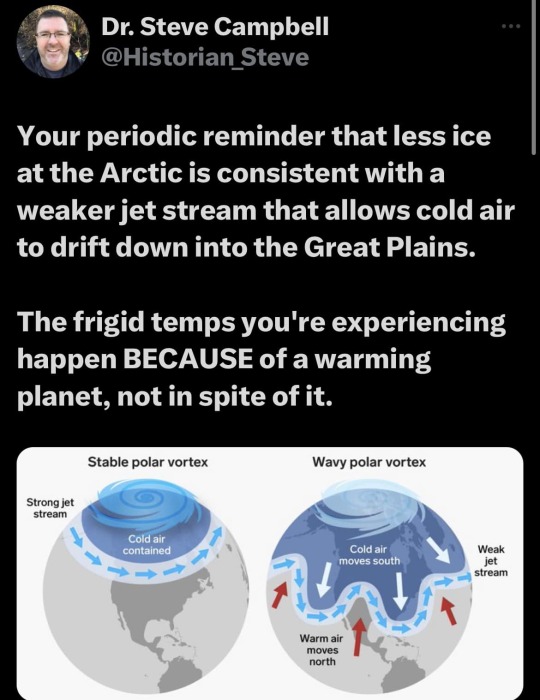
So many people do not understand the relationship between climate change and cold weather.
129K notes
·
View notes
Text
Christmas as a cultural icon is starting to get really dystopian in a climate sense, december has historically been a time of year in which there would be snow in a significant portion of europe and north america, and the fact that its not even icy this time of year and all the christmas songs and decorations reference a time of year that will likely never exist in the same way again in my life time is so strange.
#for reference i live in scotland so it is weird that there is no ice or snow in december anymore#shitpost#not really but its just how i find my original content#christmas#climate change
112K notes
·
View notes
Text
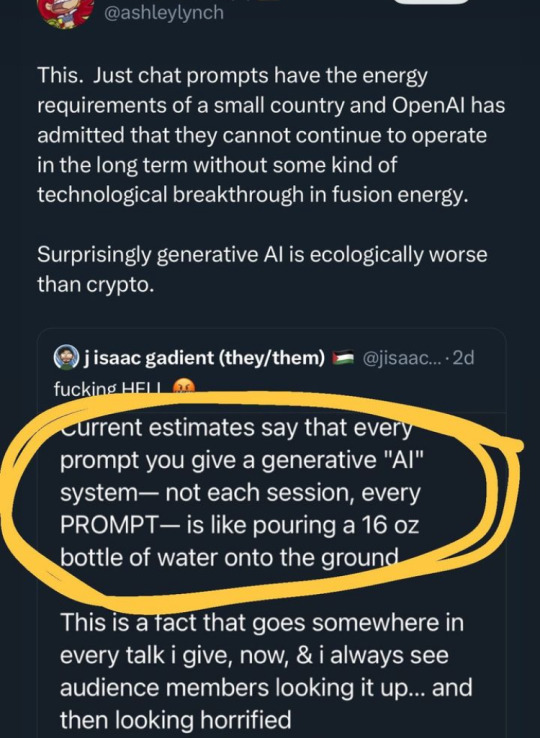
#ai#ai art#climate change#ecology#ecocide#water rights#land back#respect water treaties with First Nations#wasteland#waste#waste fraud and abuse#desertification
51K notes
·
View notes
Text
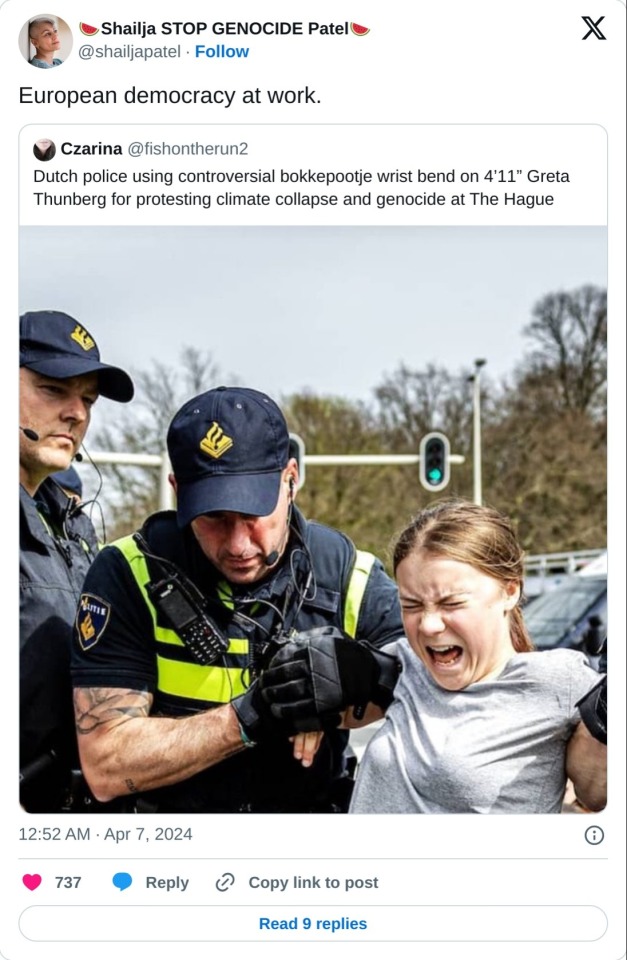
"No climate justice on occupied land"
#feminist#social justice#free palestine#settler violence#settler colonialism#genocide#climate justice#climate action#climate crisis#climate change#greta thunberg#europe#politics#the hague#netherlands#global news
50K notes
·
View notes
Text
everyone please read this and share if you can.
Brazil is going through one of the worst climatic crisis ever seen.
i live in the southernmost state, Rio Grande do Sul. we have been suffering from extreme, nonstop rainstorms for a week now. the rivers are flooding, reaching 4-6 meters above their natural level. people are being rescued by helicopters, neighborhoods are being evacuated. entire cities are slowly but surely becoming submerged in water. 60 people missing and counting. 32 deaths and counting.
and this is not new. last november also had a flood like this one. 50 dead, many material losses. it happened again this january, with thousands being left without power or water for days.
three catastrophical disasters within less than a year. three disasters only a few months apart.
this is not natural.
unsustainable agricultural practices and politics led to this. a complete disregard for nature led to this. greed led to this. always greed.
when it comes to the climate crisis, i cannot stress this enough: we need to act now if we still want to live. disasters like this are going to happen more often and they're going to be much, much worse. this flood is being considered the worst climatic catastrophe in the history of my state. i don't know how long it will take for another bigger one to happen and take its place. i just know it will be sooner than it should.
links to donate (if you can't donate, sharing already helps a lot):
link for non-brazilians (paybox)
link for brazilians
pix assufrgs
updated links are on the pinned post on my blog. in the meantime, pray for us.
#UPDATED LINKS ON THE PINNED POST ON MY BLOG#please share if you can#rio grande do sul#brasil#brazil#climate emergency#climate catastrophe#climate crisis#climate change#climate action
37K notes
·
View notes
Text

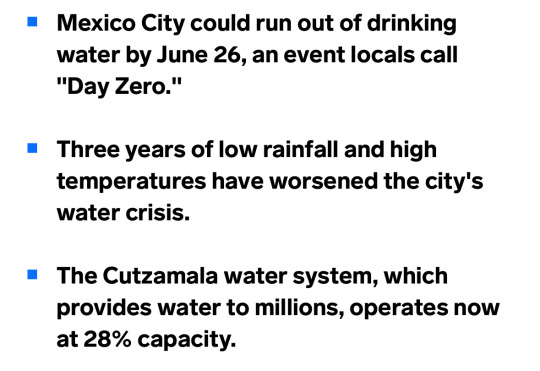
Source
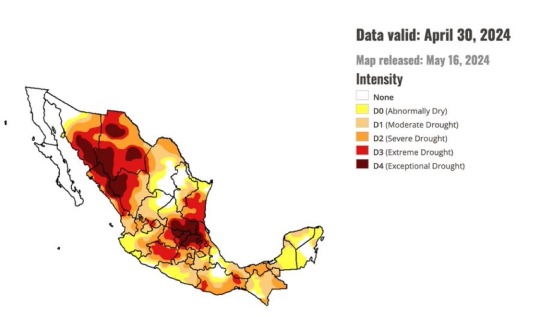
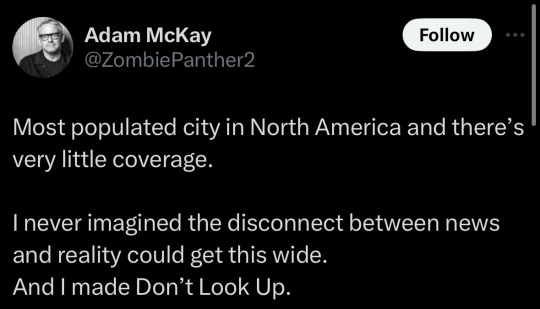
Source
#environment#Mexico#news#climate change#government#the left#progressive#twitter post#activism#current events#drought#environmentalism
24K notes
·
View notes
Text
white americans when you tell them that the idea of climate change as an impending disaster is a reductive first world perspective because it’s a tangible reality for many in the global south already:
#climate change#im TIRED#and i’m saying this as someone who also lives in the US.#im glad that none of you have to worry about your family and friends in other countries dying because of the heat#but this idea that “oh we have to stop it before we reach the extreme” is SO STUPID#because it’s already reached the extreme in some places!!#people are dying in south asia. people are dying in southeast asia. people are dying in africa. people are dying in central america.#people are dying in south america. people are dying in island nations.#what will it take you to care about these people#or will you not care until it’s people who look like you who are dying.
26K notes
·
View notes
Text
Bro, you ok? Bro, humans aren’t separate from the ecosystems around us. We’re a part of them, bro. Bro, we’re never going to have absolutely zero effect on ecosystems, because we live here, bro. Bro, I never said it had to be a bad effect. We don’t have to immediately be perfect either, bro, sometimes doing what you can is what you can, and its way better than nothing. Bro what do you mean humans are a plague. You’re starting to sound a bit like an ecofascist, bro… Bro?
55K notes
·
View notes
